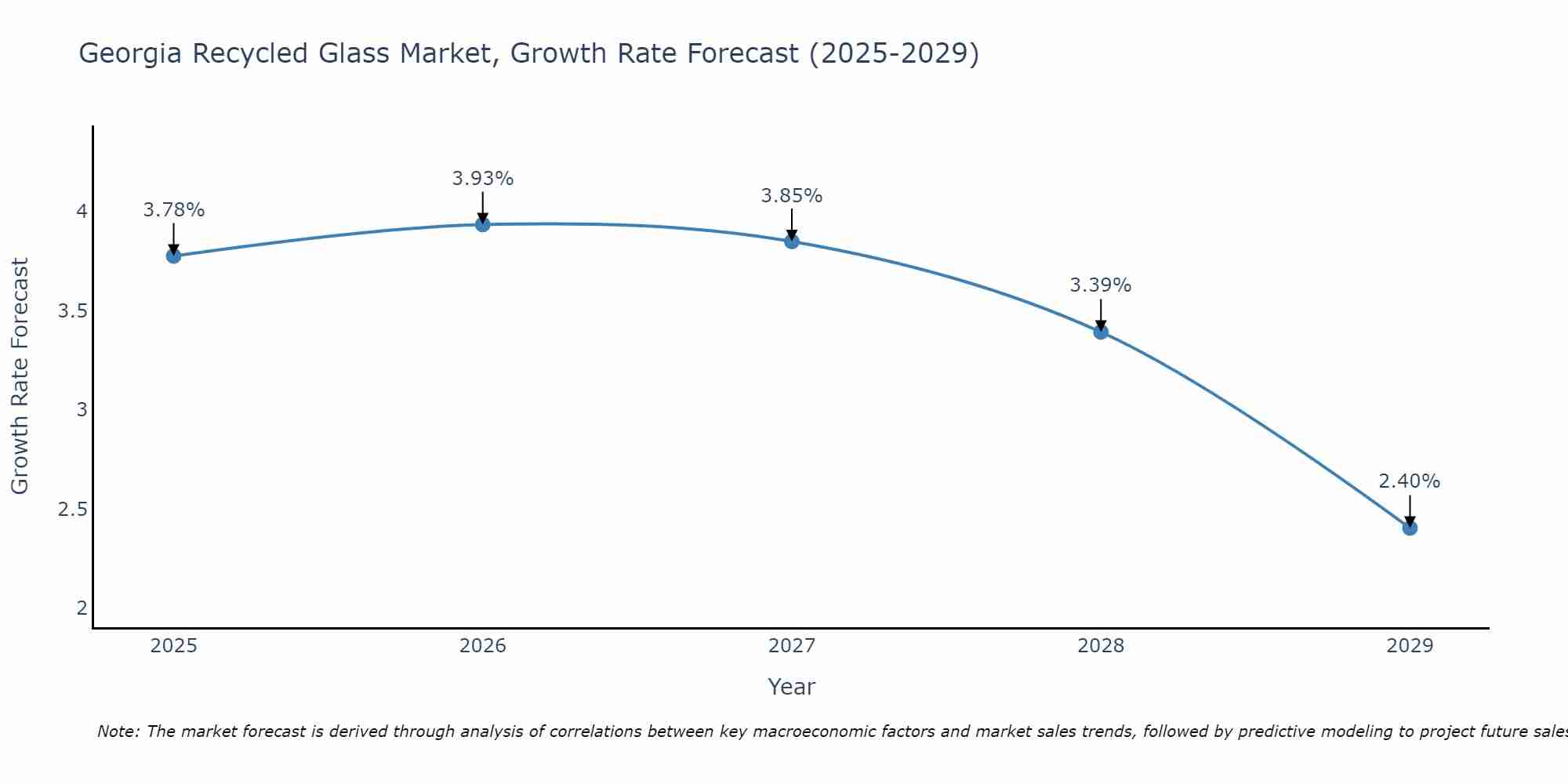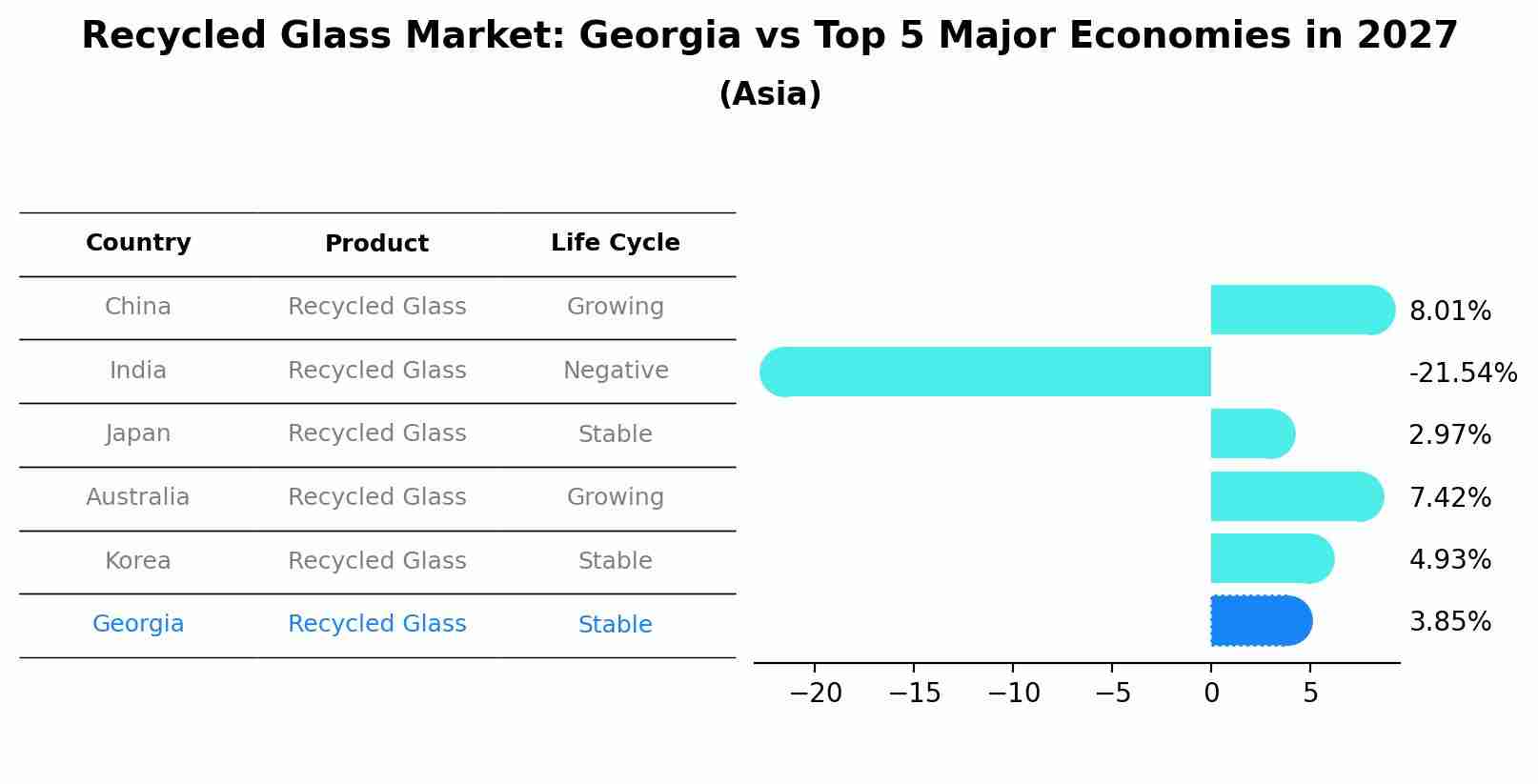Georgia Recycled Glass Market (2025-2031) Outlook | Size, Analysis, Industry, Companies, Growth, Revenue, Share, Forecast, Value & Trends
| Product Code: ETC355740 | Publication Date: Aug 2022 | Updated Date: Aug 2025 | Product Type: Market Research Report | |
| Publisher: 6Wresearch | Author: Summon Dutta | No. of Pages: 75 | No. of Figures: 35 | No. of Tables: 20 |
Georgia Recycled Glass Market Size Growth Rate
The Georgia Recycled Glass Market is projected to witness mixed growth rate patterns during 2025 to 2029. The growth rate begins at 3.78% in 2025, climbs to a high of 3.93% in 2026, and moderates to 2.40% by 2029.

Recycled Glass Market: Georgia vs Top 5 Major Economies in 2027 (Asia)
Georgia's Recycled Glass market is anticipated to experience a stable growth rate of 3.85% by 2027, reflecting trends observed in the largest economy China, followed by India, Japan, Australia and South Korea.

Georgia Recycled Glass Market Synopsis
The Georgia Recycled Glass Market is experiencing steady growth driven by increasing awareness of environmental sustainability and the benefits of using recycled materials. With a focus on reducing waste and conserving natural resources, demand for recycled glass products such as containers, countertops, and insulation is on the rise in Georgia. Companies operating in the state are actively promoting the use of recycled glass in construction, packaging, and other industries to meet sustainability goals. Additionally, government initiatives and regulations supporting recycling efforts further contribute to the market`s expansion. Overall, the Georgia Recycled Glass Market presents opportunities for businesses to capitalize on the growing trend towards eco-friendly practices and meet the demand for sustainable products in the region.
Georgia Recycled Glass Market Trends
The Georgia Recycled Glass Market is currently experiencing a growing demand due to increasing awareness of sustainability and environmental concerns. Consumers are increasingly looking for eco-friendly alternatives, leading to a rise in the use of recycled glass in various industries such as packaging, construction, and art. Local initiatives promoting recycling and waste reduction have also contributed to the market`s growth. Additionally, the state government`s support for recycling programs and incentives for businesses to use recycled materials have further boosted the market. Overall, the trend towards sustainability and the circular economy is driving the Georgia Recycled Glass Market, creating opportunities for businesses to innovate and meet the evolving needs of environmentally-conscious consumers.
Georgia Recycled Glass Market Challenges
In the Georgia Recycled Glass Market, some of the key challenges include limited infrastructure for glass recycling, lack of awareness among consumers about the benefits of using recycled glass products, and insufficient government support and incentives for recycling initiatives. Additionally, the transportation costs associated with collecting and processing recycled glass can be a barrier for businesses operating in this market. Market fragmentation and inconsistent quality standards for recycled glass products also pose challenges for both producers and consumers. Overcoming these hurdles will require collaboration between government agencies, industry stakeholders, and the public to develop more efficient recycling systems, increase education and awareness efforts, and establish clear guidelines and regulations to support the growth of the recycled glass market in Georgia.
Georgia Recycled Glass Market Investment Opportunities
The Georgia Recycled Glass Market presents promising investment opportunities due to increasing environmental awareness and government initiatives promoting sustainable practices. Investing in glass recycling facilities or technology could be lucrative as the demand for recycled glass continues to rise in various industries such as construction, packaging, and manufacturing. Additionally, there is potential for growth in the production of value-added glass products made from recycled glass, catering to the growing consumer preference for eco-friendly products. Collaborating with local municipalities and businesses to establish efficient collection and recycling programs could also be a profitable venture. Overall, the Georgia Recycled Glass Market offers a sustainable investment option with the potential for long-term growth and positive environmental impact.
Jordan Agar Market Government Policies
The Georgia government has implemented several policies to promote the growth of the recycled glass market in the state. These policies include financial incentives such as tax credits and grants for businesses that use recycled glass in their manufacturing processes. The government also mandates the use of recycled glass in certain construction projects to increase demand for recycled glass products. Additionally, there are regulations in place to encourage proper recycling practices and the development of a circular economy in the glass industry. Overall, these policies aim to reduce waste, conserve resources, and stimulate the market for recycled glass products in Georgia.
Georgia Recycled Glass Market Future Outlook
The future outlook for the Georgia Recycled Glass Market appears promising as sustainability initiatives gain traction and consumer awareness of environmental concerns continues to rise. With a growing emphasis on reducing waste and carbon emissions, there is a rising demand for recycled glass products in various industries such as construction, packaging, and art. Additionally, government regulations promoting recycling and the circular economy are likely to further drive the growth of the recycled glass market in Georgia. Companies in the state that prioritize sustainability and offer innovative solutions for utilizing recycled glass are well-positioned to capitalize on this trend and gain a competitive advantage in the market. Overall, the Georgia Recycled Glass Market is expected to experience steady growth in the coming years.
Key Highlights of the Report:
- Georgia Recycled Glass Market Outlook
- Market Size of Georgia Recycled Glass Market, 2024
- Forecast of Georgia Recycled Glass Market, 2031
- Historical Data and Forecast of Georgia Recycled Glass Revenues & Volume for the Period 2021 - 2031
- Georgia Recycled Glass Market Trend Evolution
- Georgia Recycled Glass Market Drivers and Challenges
- Georgia Recycled Glass Price Trends
- Georgia Recycled Glass Porter's Five Forces
- Georgia Recycled Glass Industry Life Cycle
- Historical Data and Forecast of Georgia Recycled Glass Market Revenues & Volume By Product for the Period 2021 - 2031
- Historical Data and Forecast of Georgia Recycled Glass Market Revenues & Volume By Crushed Glass for the Period 2021 - 2031
- Historical Data and Forecast of Georgia Recycled Glass Market Revenues & Volume By Cullets for the Period 2021 - 2031
- Historical Data and Forecast of Georgia Recycled Glass Market Revenues & Volume By Glass Powder for the Period 2021 - 2031
- Historical Data and Forecast of Georgia Recycled Glass Market Revenues & Volume By Application for the Period 2021 - 2031
- Historical Data and Forecast of Georgia Recycled Glass Market Revenues & Volume By Glass Bottle & Containers for the Period 2021 - 2031
- Historical Data and Forecast of Georgia Recycled Glass Market Revenues & Volume By Flat Glass for the Period 2021 - 2031
- Historical Data and Forecast of Georgia Recycled Glass Market Revenues & Volume By Fiber Glass for the Period 2021 - 2031
- Historical Data and Forecast of Georgia Recycled Glass Market Revenues & Volume By Highway Beads for the Period 2021 - 2031
- Historical Data and Forecast of Georgia Recycled Glass Market Revenues & Volume By Abrasives for the Period 2021 - 2031
- Historical Data and Forecast of Georgia Recycled Glass Market Revenues & Volume By Fillers for the Period 2021 - 2031
- Historical Data and Forecast of Georgia Recycled Glass Market Revenues & Volume By Others for the Period 2021 - 2031
- Georgia Recycled Glass Import Export Trade Statistics
- Market Opportunity Assessment By Product
- Market Opportunity Assessment By Application
- Georgia Recycled Glass Top Companies Market Share
- Georgia Recycled Glass Competitive Benchmarking By Technical and Operational Parameters
- Georgia Recycled Glass Company Profiles
- Georgia Recycled Glass Key Strategic Recommendations
Frequently Asked Questions About the Market Study (FAQs):
- Single User License$ 1,995
- Department License$ 2,400
- Site License$ 3,120
- Global License$ 3,795
Search
Related Reports
- Vietnam System Integrator Market (2025-2031) | Size, Companies, Analysis, Industry, Value, Forecast, Growth, Trends, Revenue & Share
- ASEAN and Thailand Brain Health Supplements Market (2025-2031) | Strategy, Consumer Insights, Analysis, Investment Trends, Opportunities, Growth, Size, Share, Industry, Revenue, Segments, Value, Segmentation, Supply, Forecast, Restraints, Outlook, Competition, Drivers, Trends, Demand, Pricing Analysis, Competitive, Strategic Insights, Companies, Challenges
- ASEAN Bearings Market (2025-2031) | Strategy, Consumer Insights, Analysis, Investment Trends, Opportunities, Growth, Size, Share, Industry, Revenue, Segments, Value, Segmentation, Supply, Forecast, Restraints, Outlook, Competition, Drivers, Trends, Demand, Pricing Analysis, Competitive, Strategic Insights, Companies, Challenges
- Europe Flooring Market (2025-2031) | Outlook, Share, Industry, Trends, Forecast, Companies, Revenue, Size, Analysis, Growth & Value
- Saudi Arabia Manlift Market (2025-2031) | Outlook, Size, Growth, Trends, Companies, Industry, Revenue, Value, Share, Forecast & Analysis
- Uganda Excavator, Crane, and Wheel Loaders Market (2025-2031) | Strategy, Consumer Insights, Analysis, Investment Trends, Opportunities, Growth, Size, Share, Industry, Revenue, Segments, Value, Segmentation, Supply, Forecast, Restraints, Outlook, Competition, Drivers, Trends, Demand, Pricing Analysis, Competitive, Strategic Insights, Companies, Challenges
- Rwanda Excavator, Crane, and Wheel Loaders Market (2025-2031) | Strategy, Consumer Insights, Analysis, Investment Trends, Opportunities, Growth, Size, Share, Industry, Revenue, Segments, Value, Segmentation, Supply, Forecast, Restraints, Outlook, Competition, Drivers, Trends, Demand, Pricing Analysis, Competitive, Strategic Insights, Companies, Challenges
- Kenya Excavator, Crane, and Wheel Loaders Market (2025-2031) | Strategy, Consumer Insights, Analysis, Investment Trends, Opportunities, Growth, Size, Share, Industry, Revenue, Segments, Value, Segmentation, Supply, Forecast, Restraints, Outlook, Competition, Drivers, Trends, Demand, Pricing Analysis, Competitive, Strategic Insights, Companies, Challenges
- Angola Excavator, Crane, and Wheel Loaders Market (2025-2031) | Strategy, Consumer Insights, Analysis, Investment Trends, Opportunities, Growth, Size, Share, Industry, Revenue, Segments, Value, Segmentation, Supply, Forecast, Restraints, Outlook, Competition, Drivers, Trends, Demand, Pricing Analysis, Competitive, Strategic Insights, Companies, Challenges
- Israel Intelligent Transport System Market (2025-2031) | Strategy, Consumer Insights, Analysis, Investment Trends, Opportunities, Growth, Size, Share, Industry, Revenue, Segments, Value, Segmentation, Supply, Forecast, Restraints, Outlook, Competition, Drivers, Trends, Demand, Pricing Analysis, Competitive, Strategic Insights, Companies, Challenges
Industry Events and Analyst Meet
Our Clients
Whitepaper
- Middle East & Africa Commercial Security Market Click here to view more.
- Middle East & Africa Fire Safety Systems & Equipment Market Click here to view more.
- GCC Drone Market Click here to view more.
- Middle East Lighting Fixture Market Click here to view more.
- GCC Physical & Perimeter Security Market Click here to view more.
6WResearch In News
- Doha a strategic location for EV manufacturing hub: IPA Qatar
- Demand for luxury TVs surging in the GCC, says Samsung
- Empowering Growth: The Thriving Journey of Bangladesh’s Cable Industry
- Demand for luxury TVs surging in the GCC, says Samsung
- Video call with a traditional healer? Once unthinkable, it’s now common in South Africa
- Intelligent Buildings To Smooth GCC’s Path To Net Zero













